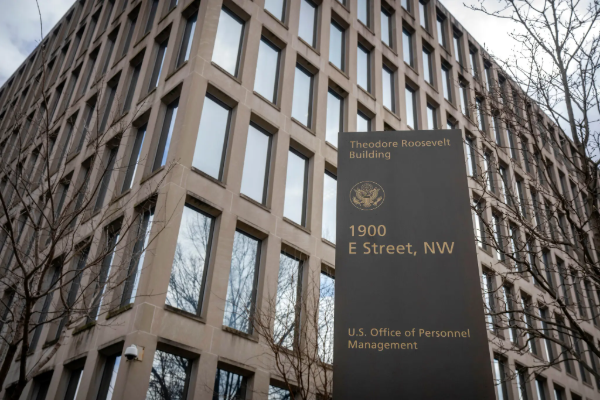The move, which could dramatically reduce the size of the federal work force, appeared to stretch the limits of President Trump’s authority.
The Trump administration on Tuesday offered roughly two million federal workers the option to resign but be paid through the end of September, in an effort to drastically reduce the size of the federal work force and push out people who do not support President Trump’s political agenda.
In an email, the Office of Personnel Management, an agency that oversees the federal civilian work force, gave employees the option to leave their positions by typing the word “resign” into the subject line of an email and hitting send. Workers have until Feb. 6 to accept the offer.
The email, with the subject line “Fork in the Road,” said that the majority of federal agencies would probably be downsized and that a substantial number of employees would be furloughed or reclassified to “at-will status” — essentially making them easier to fire. Most people who have been working remotely will be required to work from their office five days a week, the email said, and some physical offices will be consolidated, causing some people to be relocated.
The message also said that “enhanced standards of conduct” would be applied to ensure that workers were “reliable, loyal, trustworthy” and warned that “at this time, we cannot give you full assurance regarding the certainty of your position or agency.”
The email amounted to a frontal assault on the federal bureaucracy, which Mr. Trump has long derided as the “deep state” and has sought to bend to his will. In making the move, the president was testing the limits of his power, trying to push past the federal law that governs payouts and rules that have long protected the civil service from political interference and pressure.
The move also risked gutting the staffs of a wide array of federal agencies that Americans depend on, though federal unions immediately condemned the offer, and many federal employees viewed it as a trick.
The message echoed an email that the billionaire Elon Musk, a constant companion to Mr. Trump in recent months, sent to Twitter employees after buying the social media platform in late 2022. Mr. Musk’s email shared the same subject line and offered employees three months of severance.

Mr. Musk, who is leading the Trump administration’s cost-cutting effort known as the Department of Government Efficiency, does not officially work at the Office of Personnel Management. But the agency has hired several of Mr. Musk’s allies in recent weeks, including Amanda Scales, who until this month worked at Mr. Musk’s artificial intelligence company, xAI, and is now the O.P.M.’s chief of staff.
In a post on X on Tuesday, Mr. Musk’s America PAC said the move to offer severance packages could lead to billions of dollars in savings. Mr. Musk recirculated the post on his social media platform.
Employees who accept the offer will “promptly have their duties reassigned or eliminated,” according to a guidance memo published by the O.P.M. on Tuesday. Workers will then be placed on paid administrative leave until the end of September, or an earlier resignation date of their choosing.
Employees who resign will not be expected to work, except in rare cases determined by agencies, according to a question-and-answer page on O.P.M.’s website. Agency heads can require some employees to continue working for some time before they are placed on leave.
It is unclear what authority the Trump administration has to offer paid administrative leave to effectively the entire federal civilian work force. Under the law, no employee can be on administrative leave for more than 10 days in a year — let alone more than seven months.
Under the Homeland Security Act, agencies that are downsizing or reorganizing can offer federal workers $25,000 in exchange for their resignation, known as a Voluntary Separation Incentive Payment. In many cases, though, the payments proposed in the O.P.M.’s email Tuesday would far exceed that sum.
Other actions mentioned in the email to federal employees could run afoul of civil service laws, as well as union contracts. Anticipating those limits, the O.P.M. said in the email that the effort to cull the federal work force would be pursued “to the extent permitted under relevant collective-bargaining agreements.”
A spokesperson for the Office of Personnel Management stated that certain workers would be exempt from the offer, including military personnel, Postal Service employees, immigration officials, and select national security personnel. Agencies may also make exceptions for specific roles.
However, mass resignations could severely impact nearly every sector of the government, with far-reaching consequences for many Americans. Routine activities like travel, passport renewals, and tax filings could face delays or disruptions. National parks, museums, and the administration of essential benefits such as Social Security, Medicare, veterans’ care, and food assistance might also be affected. Additionally, government regulators and inspectors overseeing food, water, drugs, and workplace safety could vacate their positions.
Potential resignations might include skilled professionals such as researchers, doctors, environmental and nuclear scientists, rocket experts, and meteorologists at the National Weather Service. Depending on the administration’s definition of “national security,” even law enforcement personnel from agencies like the F.B.I. and the Drug Enforcement Administration could leave their posts.
The American Federation of Government Employees, the largest union representing over 800,000 federal workers, swiftly condemned the move.


